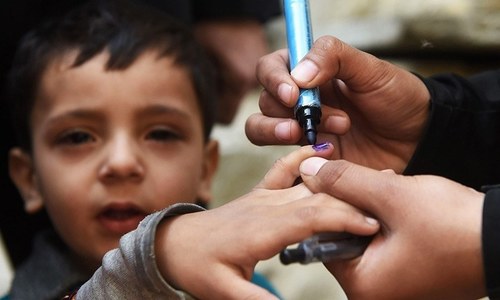• Shows concern over highest-ever number of children missed during a recent polio campaign
• NHS spokesperson says new strategy formulated to address the issue
LAHORE/ISLAMABAD: Bringing Pakistan’s political issues under discussion at a global health forum for the first time, the International Monitoring Board (IMB) has declared the ‘polio programme and the importance of delivering polio vaccine has become a political football in the country’.
The IMB, which provides an independent assessment of the progress made by the Global Polio Eradication Initiative (GPEI) in the detection and interruption of polio transmission globally, sees lack of political unity behind polio resurgence in the country.
“Early in 2018, the Polio Programme in Pakistan believed that it was on the brink of interrupting wild poliovirus transmission. Just over a year later, the epidemiological picture in the country represents a massive reversal of the trajectory to global polio eradication,” says the latest IMB report.
The IMB also expresses serious concern over the September 2019 campaign in which the highest-ever number of missed children in Pakistan were reported. The reports says polio in Pakistan began its resurgence in the third quarter of 2018, and intensified in the second quarter of 2019, with a record number of cases (38) in that quarter alone. This was followed by 30 cases in the third quarter of 2019.
“The epidemiological situation is grave and of very deep concern. Pakistan has reported more than 80 per cent of the total global polio cases this year, with 90pc of them reported outside the traditional core reservoirs (Oct 25, 2019),” reads the IMB report.
“Throughout the lifetime of the IMB, the Technical Advisory Group for Pakistan has made helpful and constructive criticism of the polio programme in Pakistan allowing technical areas to be addressed and strengthened,” according to the IMB report. However, it says, the most recent report of this committee made a searing and devastating condemnation of the state of polio transmission in Pakistan.
Its report says, “The programme in KP has shifted from being an example to the country as a whole to becoming an emblem of the national programme’s current crisis. The KP has reassumed its position as a major global barrier to polio eradication.”
It says, “Transmission in Karachi is now everywhere”, while in Punjab “signs of programme deterioration are everywhere.”
The IMB in its November report states the polio programme remains particularly susceptible in many areas of Pakistan “where the power structure is divided between different political parties”.
The report says, “it seems extraordinary that the IMB’s analysis found that 89 per cent of all paralytic polio cases over nearly the last eight years have been in Pashto-speaking families (Oct 25, 2019). Yet the GPEI does not seem particularly interested in this striking statistic as an opportunity for a major breakthrough.”
The IMB questions, “How can the people of Pakistan have faith that the polio programme is working in their interests if they hear conflicting messages from their political leaders?”
The report also mentions that at the board’s meeting in October 2019, there could not have been a starker contrast between the Nigerian and the Pakistan government delegations. “Both groups were led by health ministers and those running the programme delivery,” it observes. But it says the Nigerian delegation included all three chairmen of the health committees in the House of Representatives and the Senate, who were from different political parties. “And what is more, Nigeria has just had a national election, just like Pakistan,” the IMB report says while releasing fresh report on the disturbing and alarming increase in polio cases in Pakistan.
“The IMB has found the GPEI and the country’s polio programme very slow to learn, or adopt best practices from elsewhere. Top programmatic performance is achieved when the best technical standards and procedures are delivered after being shaped and focused by accurate and timely local knowledge and context.
The number of wild poliovirus cases stood at 77 in Pakistan and at 19 in Afghanistan on Oct 29, 2019. The corresponding figures for the same time in 2018 were six for Pakistan and 19 for Afghanistan.
While talking to Dawn, spokesperson for the Ministry of National Health Services Sajid Shah said a new strategy had been formulated to address the issue and reappointment of Dr Rana Safdar as polio coordinator at the National Emergency Operation Centre was part of that strategy. “Dr Safdar reduced cases from 306 (in year 2014) to just eight in 2018,” he claimed.
So far this year 88 polio cases have been reported from across the country. Last year 12 cases were reported while only eight cases had been identified in 2017. Of the 88 cases reported from across the country, 64 were detected in KP only, while 10 cases were confirmed in Sindh, seven in Balochistan and five cases were found in Punjab.
Mr Shah agreed that there were issues with the programme in the past but said it had been reviewed to completely eradicate the virus. He said: “Special Assistant to Prime Minister Dr Zafar Mirza is in the UAE, collaborating with international donors and stakeholders to protect the children of Pakistan from polio virus.”
Published in Dawn, November 20th, 2019
















































Dear visitor, the comments section is undergoing an overhaul and will return soon.